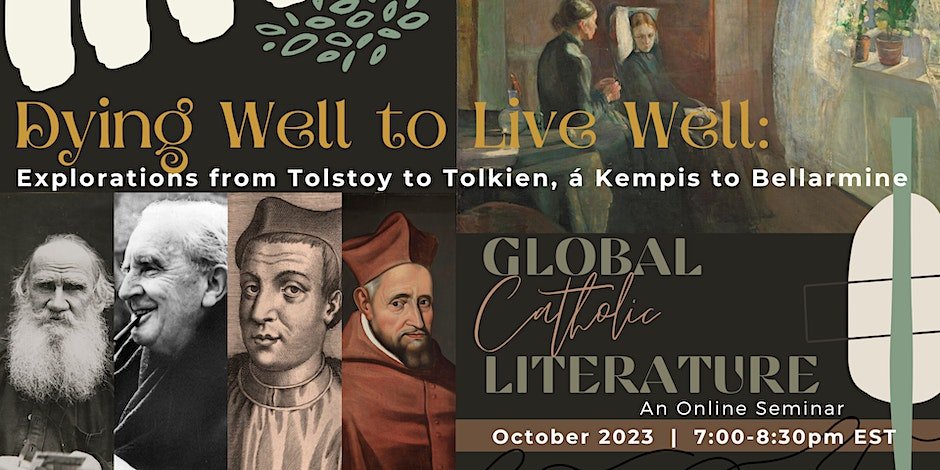Friday Links
August 25, 2023
DT & Collegium: Dying Well to Live Well
Fr. Michael Rennier interviews poet Anna Key
Joshua Hren: In Search of Ordinary Time
John-Paul Heil: The Field is the World
J.C. Scharl in Ekstasis: “Salt”
Julia Yost: Austen’s Darkness
DT & Collegium: Dying Well to Live Well
Join Collegium Institute and Dappled Things magazine for our online Global Catholic Literature Seminar, Dying Well to Live Well. In this seminar, we’ll pair acclaimed modern novellas—Leo Tolstoy’s “The Death of Ivan Ilych” and J.R.R. Tolkien’s purgatorial fantasy “Leaf by Niggle”—with the most famous medieval and renaissance devotional manuals by Thomas à Kempis and St. Robert Bellarmine on making ready for life’s ending. Through these diverse depictions and reflections, we’ll investigate questions of how we can live full lives in the awareness of suffering, mortality, and human limitation. How should we understand the rich tradition of “Ars Moriendi” in its Christian expression? How can we face the inevitable with a sense of peace, acceptance, and confidence? And how might life’s impermanence provide, not a reason for despair, but an orientation toward greater meaning and purpose?
We will meet four Monday evenings in October, 7:00-8:30pm ET on Zoom. For more information and to register, please go here.
Fr. Michael Rennier interviews poet Anna Key
Our very own Fr. Michael Rennier interviews Anna Key about her new book of poems, After Colonna. He believes this book is a “gift of beauty to the world.”
One of my central beliefs is that all of us — no matter who we are or what our station in life is — are meant to contribute beauty to the world by making our lives beautiful. Beauty lifts our eyes to heaven and reveals the truth about God and the human soul. Poetry, music, and the visual arts are specific ways of being attentive to beauty, but really, it’s the whole of our lives that are poetic. This means that everyone is something of a poet. Even our smallest actions are connected to transcendent beauty.
Joshua Hren: In Search of Ordinary Time
What are we to make of the Gospels’ “noteworthy silence concerning everyday life”?
There is no chapter that reads like so: Jesus played outside. Joseph coughed and laughed. Mary did the dishes. And yet, this playing and coughing and doing of dishes is what, for most of us, comprises so much that happens in ordinary time.
The fellowship, then, must happen through a mysterious silence. But how?
John-Paul Heil: The Field is the World
In trying to feed more people, we starved their bodies and their souls. Harming the soil is an ethical matter and, more fundamentally, a cosmological and anthropological one. Our cosmology, the way we see and interpret reality, is inseparable from our anthropology, the way we understand others and ourselves as human beings.
J.C. Scharl in Ekstasis: “Salt”
A really lovely poem from J.C. Scharl. . .
Julia Yost: Austen’s Darkness
Julia Yost offers an unusual take on Austen’s work, one that looks at the dark corners of Highbury’s drawing rooms:
Even in Austen’s arcadia, death lurks, along with other consequences of the fall: hatred, fear, privation. As for class difference, it was not instituted primarily for the testing and vindication of meritorious young ladies, but gives cover to the cruelties we perpetrate without admitting it, the hatreds we deny we bear.


